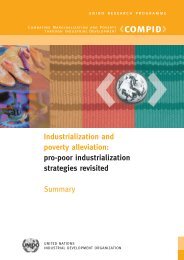Manual on the Development of Cleaner Production Policies ... - Unido
Manual on the Development of Cleaner Production Policies ... - Unido
Manual on the Development of Cleaner Production Policies ... - Unido
You also want an ePaper? Increase the reach of your titles
YUMPU automatically turns print PDFs into web optimized ePapers that Google loves.
DEVELOPMENT OF CP POLICY<br />
MODULE 4: POLICY TOOLS AND INSTRUMENTS<br />
Dem<strong>on</strong>strati<strong>on</strong> projects are used to show <strong>the</strong> techniques and cost-saving opportunities associated with<br />
<strong>Cleaner</strong> Producti<strong>on</strong> in selected plants. Governments can promote CP through targeted, high pr<strong>of</strong>ile<br />
dem<strong>on</strong>strati<strong>on</strong> projects in firms whose success will be credible to o<strong>the</strong>r firms in <strong>the</strong> sector.<br />
Disseminating best industry practices provides firms with relevant informati<strong>on</strong> <strong>the</strong>y can use to alter<br />
<strong>the</strong>ir own practices, as well as a reference point to show how <strong>the</strong>y are doing in relati<strong>on</strong> to <strong>the</strong> industry<br />
as a whole. Very important in this c<strong>on</strong>text is benchmarking. The EPA managed Enviro$en$e initiative<br />
is a good example <strong>of</strong> an informati<strong>on</strong> clearing house.<br />
http://es.epa.gov/<br />
It has, however, proven difficult to disseminate informati<strong>on</strong> about cleaner technologies—particularly<br />
to small and medium enterprises—in an effective manner. It has <strong>of</strong>ten been observed that results to<br />
date are not very impressive. As far as small and medium enterprises are c<strong>on</strong>cerned, many people<br />
maintain that <strong>the</strong> most effective informati<strong>on</strong> transfer approach for promoting cleaner technologies is<br />
by means <strong>of</strong> c<strong>on</strong>sultants who work <strong>on</strong>-site for a certain period <strong>of</strong> time. One example <strong>of</strong> an Internetbased<br />
approach is <strong>the</strong> Green Pr<strong>of</strong>it initiative. It is a database <strong>of</strong> CP quick scans in SMEs, intended to<br />
make o<strong>the</strong>r small companies aware <strong>of</strong> <strong>the</strong> envir<strong>on</strong>mental and ec<strong>on</strong>omic benefits <strong>of</strong> CP.<br />
http://www.greenpr<strong>of</strong>it.net<br />
SLIDE: Informati<strong>on</strong>-based strategies/3<br />
• Industry codes <strong>of</strong> practice (greenhouse gas emissi<strong>on</strong>s in <strong>the</strong> Ne<strong>the</strong>rlands);<br />
• Voluntary polluti<strong>on</strong> preventi<strong>on</strong> agreements (c<strong>of</strong>fee sector in Costa Rica;<br />
US 33/50 Toxic Chemical Emissi<strong>on</strong> Reducti<strong>on</strong> Program);<br />
• Public educati<strong>on</strong> campaigns (energy efficiency and water savings<br />
campaign).<br />
Industry codes <strong>of</strong> practice<br />
Codes <strong>of</strong> practice are generally sector-based and provide guidance to industry <strong>on</strong> a range <strong>of</strong><br />
envir<strong>on</strong>mental issues such as resource usage, emissi<strong>on</strong>s, waste generati<strong>on</strong> and disposal, occupati<strong>on</strong>al<br />
or health hazards and regulatory standards. The aim <strong>of</strong> such codes is to support improvements to<br />
industry by providing pertinent informati<strong>on</strong> and suggesting practices and processes that individual<br />
companies can adopt.<br />
Codes <strong>of</strong> practice can also dem<strong>on</strong>strate best practices and can provide informati<strong>on</strong> and advice to firms<br />
about how to introduce envir<strong>on</strong>mental improvements. Best practice guidelines dem<strong>on</strong>strate best<br />
practices in <strong>the</strong> industry for firms c<strong>on</strong>sidering improvements, and can also provide a benchmark for<br />
measuring progress.<br />
Codes <strong>of</strong> practice may also provide a means by which regulatory bodies can work with smaller<br />
industries. Sector-based codes <strong>of</strong> practice can be developed into regulatory standards with cooperati<strong>on</strong><br />
between industry and government. For <strong>the</strong>se codes to be effective, mechanisms need to be in place to<br />
encourage implementati<strong>on</strong> <strong>of</strong> <strong>the</strong> code, m<strong>on</strong>itor and publicly report <strong>on</strong> adherence, and to impose<br />
meaningful sancti<strong>on</strong>s in additi<strong>on</strong> simply to peer pressure.<br />
Some <strong>of</strong> <strong>the</strong> codes <strong>of</strong> practice applied worldwide include <strong>the</strong> Internati<strong>on</strong>al Chamber <strong>of</strong> Commerce’s<br />
Business Charter for Sustainable <strong>Development</strong>, and <strong>the</strong> Resp<strong>on</strong>sible Care Programme, which is<br />
overseen by <strong>the</strong> Internati<strong>on</strong>al Council <strong>of</strong> Chemical Associati<strong>on</strong>s.<br />
PAGE 110
















